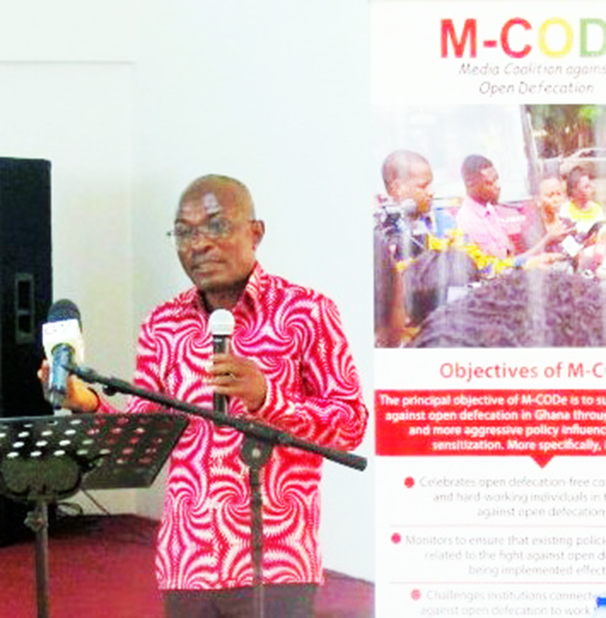Mr Yaw Attah Arhin, the Water Sanitation and Hygiene (WASH) Technical Specialist at World Vision Ghanahas urged policy makers and governments to focus on achieving SDG-6 target 2, which targets open defecations and clean environment for the people.
According to him, the fight against open defecation would be successful when tackled from places of decision-making and the government making the fight a priority.
Mr. Arhin noted that there was the need to move the campaign against open defecation beyond the current public education to a higher level where decision-makers would ensure that concrete steps had been taken to achieve results in line with the Sustainable Development Goals.

He stated that, the SDG-6 target 2 mandates countries to achieve access to adequate and equitable sanitation and hygiene for all and end open defecation by 2030, paying special attention to the needs of women and girls and those in vulnerable situations.
Mr Arhin was speaking at the Media Coalition against Open Defecation (M-CODe) National Working Group (NWG) empowerment summit sponsored by World Vision Ghana.
The M-CODe Empowerment Summit forms part of the “M-CODe 2023 Anti-Open Defecation Nationwide Advocacy efforts supported by World Vision Ghana.
He said open defecation is persisting in Ghana, hence the need for efforts to be mobilised to eradicate it.
He disclosed that one gramme of human faeces contains about 10 million viruses and one million bacteria, among others.
The WASH Technical Specialist reminded the public in the decision making positions that nothing could be more important to the welfare of children in Ghana than improved sanitation, safe drinking water and good hygiene, which are covered by the fight against open defecation.
He said all efforts in the various sectors would be eroded if the issues of sanitation were not tackled well for which reason World Vision Ghana is committed to WASH and huge investment into its activities.
According to him, the media also had the power to eliminate open defecation by 2030 and entreated the media houses to work in collaboration with other stakeholders to attract the funding for such WASH projects.
Mr. Francis Ameyibor, the National Convener of M-CODe, outlining the work of the National Working Group, said it would pursue the objectives of the Coalition in the regions, coordinate fundraising activities and monitor progress for accountability, among others.
He said M-CODe, as part of its advocacy strategy, had developed an advocacy roadmap for eradicating open defecation, prioritised the Rural Sanitation Model and Strategy among others.
He appealed to President Nana Addo Dankwa Akufo-Addo to launch the Presidential Special Initiative (PSI) on ending open defecation providing toilets in all schools and healthcare facilities.
Mr Ameyibor said M-CODe is building alliances with strategic stakeholders, including the Regional Coordinating Councils, Environmental Health Department, Ghana Education Service, Ghana Health Service, Community Water and Sanitation Agency, and the Department of Community Development, to revitalise advocacy against open defecation.
Other stakeholders included the Department of Gender, the National Commission for Civic Education, Regional Environmental Officers, the Environmental Protection Agency, World Vision, and civil society organisations.
The rest are Regional Officers from the Environmental Protection Agency, the Ministry of Sanitation, and the Ministry of Local Government and Rural Development, among others, who work to revive and maintain the activism to alter the rules and build a society free of open defecation.









